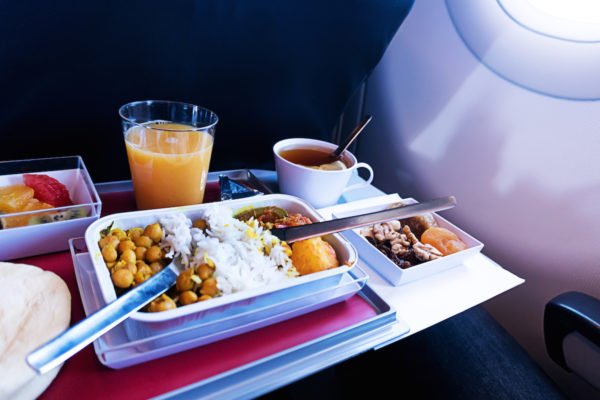
Why Food Tastes Different on Planes
Not many people are fans of airline food, but as it turns out, you don’t taste food in the air the same way you do on the ground. Several factors on the plane — including the background noise, pressurized cabin, and dry air — all suppress your ability to taste sweet and salty food by at least 30%.

Ever look at the beverage cart on a plane and see it piled high with tomato juice? It’s not a common juice, like orange or apple. So why are so many people drinking it in flight? Put simply? Your taste changes while you’re in the air. And there’s a biological reason for that.
If you grab a bite before your flight, you probably have an idea of what it will taste like. But once you’re in the air, your sense of taste isn’t the same as it is on the ground. A lot of factors on the plane are all coming together to suppress your sense of smell, which makes up a large portion of our sense of taste.
Think back to the last time you had a cold. Remember how you couldn’t taste anything because your nose was clogged up? When you have a weakened sense of smell, your perception of taste is reduced. So your in-flight nose is similar to your nose when you have a cold, but hopefully with less phlegm.
Let’s start with the cabin, which is extremely dry. Drier-than-some-deserts dry. The dry cabin dries out your nasal passages, which means your taste buds become less perceptive. But that’s not the only part of the cabin suppressing your sense of taste. The low cabin pressure actually decreases the levels of oxygen in your blood, which means your olfactory receptors, the part of your nervous system that responds to smells, become less sensitive, which actually weakens your sense of smell.
But it’s not just the environment inside the cabin that’s affecting your senses. The noise coming from the engine isn’t helping either. A 2010 study tested people’s sense of taste both inside and outside a simulated plane cabin. The researchers found sensitivity to sweet and salty food was reduced by 30% while in the cabin.
And that weakened sense of taste can cause a lot of problems for airline caterers, who have to modify every recipe to account for it. To top it off, not every flavor is affected equally. Some ingredients, like curry and lemongrass, actually become more intense in the sky, while cinnamon, ginger, and garlic tend to maintain their taste. Some airlines will use naturally intense flavors, like certain fruit and vegetable oils and concentrates, which helps to lessen the amount of extra salt a recipe might need.
So, what does tomato juice have to do with all of this? Well, tomato juice tends to have a savory flavor referred to as umami. It’s one of the five categories of taste, along with sweet, sour, salt, and bitter. A 2015 study found that, with umami, the taste phenomenon is actually reversed. Umami is actually enhanced in the air.
So the next time you’re on a flight, give the tomato juice a try. And don’t get too upset if your meal doesn’t taste as good as you hoped. The chefs are just trying to accommodate for something you didn’t know was happening right underneath your nose.














































